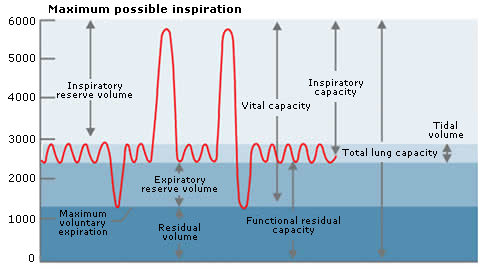Even with a clear airway, ventilation (breathing) may be inadequate because of:
- Central depression of respiratory drive as a result of IV/inhalational anaesthetics, opioids or benzodiazepines
- Peripheral impairment of respiratory mechanics from residual neuromuscular blockade, diaphragmatic splinting (obesity, abdominal distension) or pain (thoracic or abdominal surgery)
Question: What factors are associated with prolonged neuromuscular blockade?
Click here for the answer.

Fig 1 Spirometry
Even with a clear airway, ventilation (breathing) may be inadequate because of:
- Central depression of respiratory drive as a result of IV/inhalational anaesthetics, opioids or benzodiazepines
- Peripheral impairment of respiratory mechanics from residual neuromuscular blockade, diaphragmatic splinting (obesity, abdominal distension) or pain (thoracic or abdominal surgery)
Question: What factors are associated with prolonged neuromuscular blockade?
Answer: Factors associated with prolonged neuromuscular blockade include:
- Hypothermia
- Respiratory acidosis
- Electrolyte abnormalities: hypokalaemia, hypocalcaemia, hyponatraemia, hypermagnesaemia
- Drug interactions: volatile agents, calcium channel blockers, aminoglycosides, diuretics
- Decreased excretion: renal failure, liver failure
Click here to see: Other causes of hypoxaemia.

Fig 1 Spirometry
Even with a clear airway, ventilation (breathing) may be inadequate because of:
- Central depression of respiratory drive as a result of IV/inhalational anaesthetics, opioids or benzodiazepines
- Peripheral impairment of respiratory mechanics from residual neuromuscular blockade, diaphragmatic splinting (obesity, abdominal distension) or pain (thoracic or abdominal surgery)
Question: What factors are associated with prolonged neuromuscular blockade?
Answer: Factors associated with prolonged neuromuscular blockade include:
- Hypothermia
- Respiratory acidosis
- Electrolyte abnormalities: hypokalaemia, hypocalcaemia, hyponatraemia, hypermagnesaemia
- Drug interactions: volatile agents, calcium channel blockers, aminoglycosides, diuretics
- Decreased excretion: renal failure, liver failure
Other causes of hypoxaemia include:
- Pulmonary complication - atelectasis, aspiration, pulmonary oedema, pneumothorax
- Diffusion hypoxia (from nitrous oxide use)
- Increased oxygen utilization – shivering, pyrexia, sepsis
- Low cardiac output states